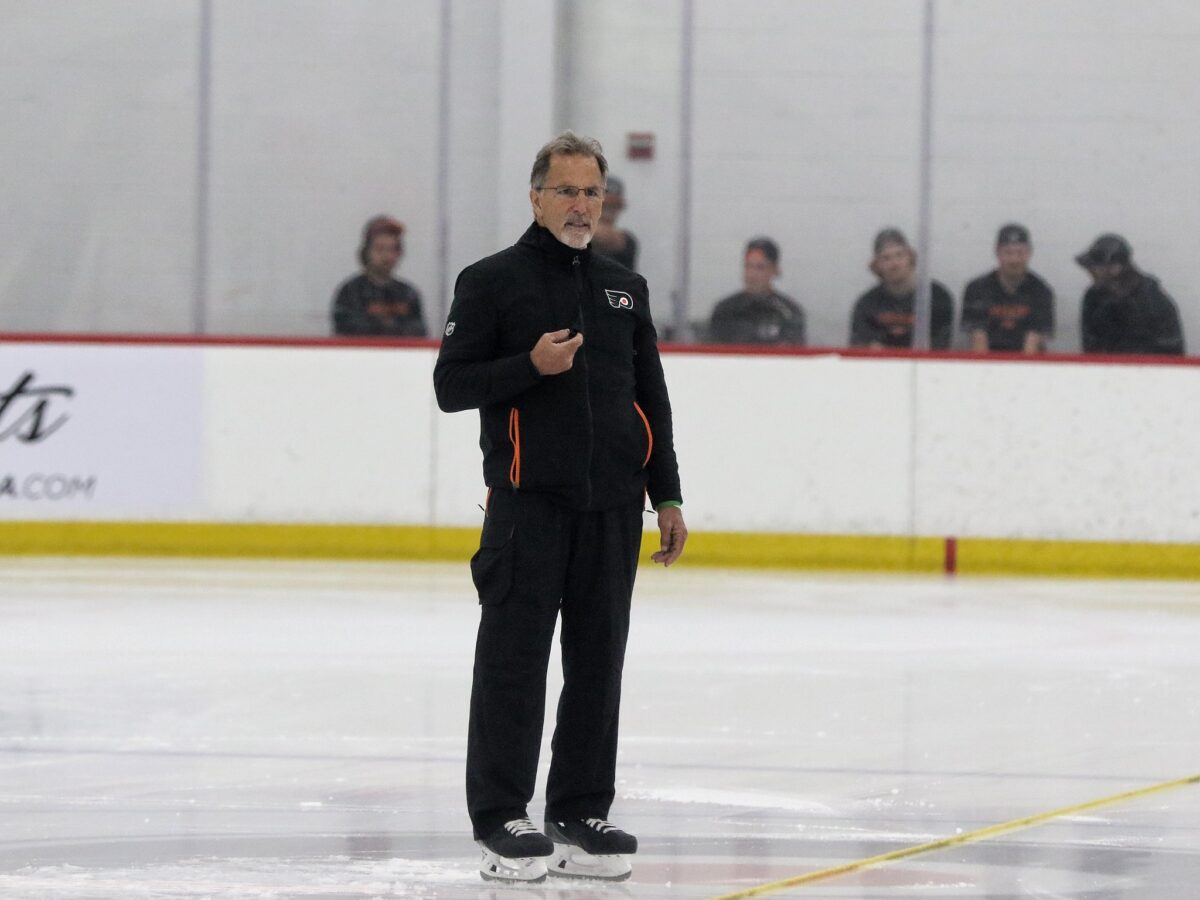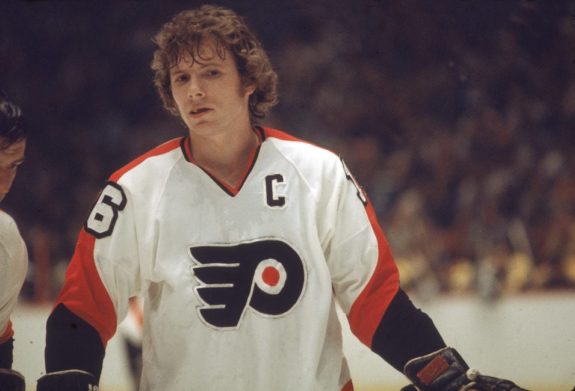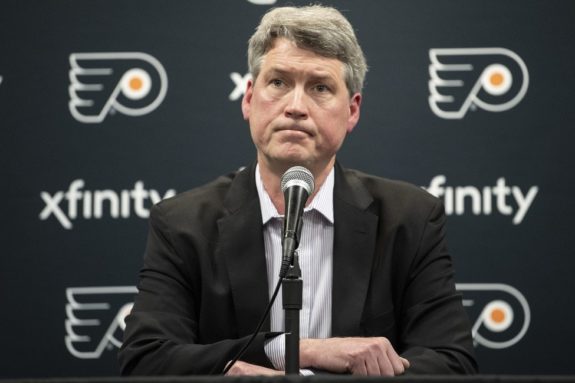When Philadelphia Flyers season ticket holders received a letter about the state of the organization, they might’ve been surprised about whose signature was on the bottom. Head coach John Tortorella has coached only 54 games in Philadelphia with a mediocre (at best) roster, yet he is already the face of a franchise with a long and storied history.
After word spread about the Flyers’ decision to send out the letter, the media immediately pointed to a similar situation with the New York Rangers in February 2018. However, the letter to the New York fan base came from president Glen Sather and general manager (GM) Jeff Gorton. Why wasn’t the name of Flyers GM Chuck Fletcher penciled in? Are we seeing a shift in the power structure of the Philadelphia front office in favor of Tortorella?
The Tortorella Letter
“Now, I’m not going to lie to you– and I want to be clear about this – we’re not there yet. This year was the first step in building the future of the Flyers and restoring our reputation as one of the most respected teams in hockey,” Tortorella’s letter stated.

Two days later, the former Stanley Cup winner dropped the dreaded word “rebuild” once again in an interview on 97.5 The Fanatic. The terminology directly conflicts the message Fletcher gave in early December when he spoke optimistically about the team’s chances to close the gap in the standings and earn a playoff berth with the help of some veterans returning from injury.
No members of the organization will come out and say it publicly, but the implications of their actions speak much louder than their words. This is an instance of the Flyers siding with their first-year head coach in a situation when he directly contradicted the GM about a topic that encapsulates the entire direction of the franchise.
Power Structure of the Flyers
The organization sided with the head coach on an issue that has a lot more to do with the responsibilities of a GM, so does that mean they’re planning to move on from Fletcher? A long history of the organization makes a seemingly obvious answer much more complicated.
The most prominent senior advisors in the front office have roots that run deep in the organization’s history. Long-time NHL executive Dean Lombardi and Flyers Hall of Famers Bobby Clarke, Billy Barber, and Paul Holmgren make up the center of a tight-knit, rigid network of NHL lifers. The decision to bring in Fletcher was even partly based on his previous relationship with Clarke.

The Flyers plummeted during the 2020-21 and 2021-22 seasons as badly as they have at any point over their storied franchise history. They missed the playoffs in consecutive seasons for the first time since 1992-93 and 1993-94. Their reputation as a top-tier NHL organization had been fading away, and it is now officially gone. Franchise governor Dave Scott spoke in January 2022 about the plan to fix the issues after the Flyers had fallen out of playoff contention.
“I can tell you, everything’s on the table,” Scott said. “We’re looking at the front office. We’re looking at the coaching staff — which we have been — players, investment, whatever we need to do to improve this team.”
Related: Flyers Offer Player Perspectives on NHL Trade Deadline
Scott also spoke in December 2018 about the “bias for action” in the organization throughout its history. However, he chose to stand pat with Fletcher, a GM who had allowed the team to slip into its worst position in over a half-century of existence. His only relevant move came two weeks later when the Flyers promoted Danny Brière to a new position as a special assistant to the GM.
Fletcher’s status within the organization is a major point of contention within the fan base, which likely factored into the organization’s decision to leave his name off the letter. Entering the 2022-23 season, though, the venom from the fan base didn’t seem to impact the organization’s evaluation of the GM. They’ve actually shown stubborn support considering the lack of recent success.
Tortorella: The Ultimate Wild Card
While an in-season GM change seems unlikely just over three weeks away from the 2023 Trade Deadline, Fletcher no longer has the best job security. What’s changed? John Tortorella.
The Flyers heavily emphasized subjective ideas like culture, accountability, and a new standard when they hired him. His old-school attitude originally seemed like it would fall right in line with the ideas of the front office brain trust. However, he hasn’t exactly gone along with what his boss has done so far.
Tortorella isn’t shy about expressing his feelings, and he doesn’t back down on his will. He didn’t plan on playing Kevin Hayes at center just because Fletcher signed him as a center with an annual cap hit of $7.14 million through 2025-26. He didn’t plan on dressing Rasmus Ristolainen early in the season just because the defenseman was just beginning a five-year contract worth $25.5 million.
Fletcher also invested significant resources to acquire Tony DeAngelo during the 2022 offseason. Tortorella has publicly questioned whether DeAngelo’s poor defensive game was covered up by talented teammates in a strong 2021-22 season with the Carolina Hurricanes. It sounds like a coach is pointing out an issue a GM should’ve considered before making a major trade. Tortorella has healthy scratched Hayes, Ristolainen, and DeAngelo at different points in 2022-23.
“I just need to give him (Fletcher) the honest information that I have as the head coach of the team as far as where I see him (a given player). Is he (the player) part of this (the Flyers)? Do we want him (to be) part of it?” Tortorella said in November about his relationship with Fletcher.
Tortorella has also brought up the likely outcome of veteran players who are not part of the solution and the rebuild moving ahead of the 2023 Trade Deadline or during the offseason. How much control does an NHL head coach really have in those types of decisions though?

The Flyers have hired plenty of head coaches throughout their history with impressive accomplishments in previous stops. None of them overrode their GMs like Tortorella appears to be doing. Ken Hitchcock and Peter Laviolette both took the job in Philadelphia with matching resumes of seven years as an NHL head coach and one Stanley Cup. Roger Neilson was a head coach for parts of 12 seasons before coming to the Flyers in March 1998. Alain Vigneault brought the experience of 16 NHL seasons and two Stanley Cup appearances.
Around the NHL, there are limited cases of head coaches with heavy involvement in player personnel. It usually takes a coach with as much of a track record as Joel Quenneville had late in his tenure with the Chicago Blackhawks. Patrick Roy even stepped away from the Colorado Avalanche in 2016 because he didn’t have enough input in player personnel.
Tortorella, however, is the ultimate wild card. Don’t expect him to back down on what he believes, and right now he believes his vision for the future of the Philadelphia Flyers is better than Chuck Fletcher’s. We now have a major indicator that points to a potential shakeup in the power structure of the Flyers.